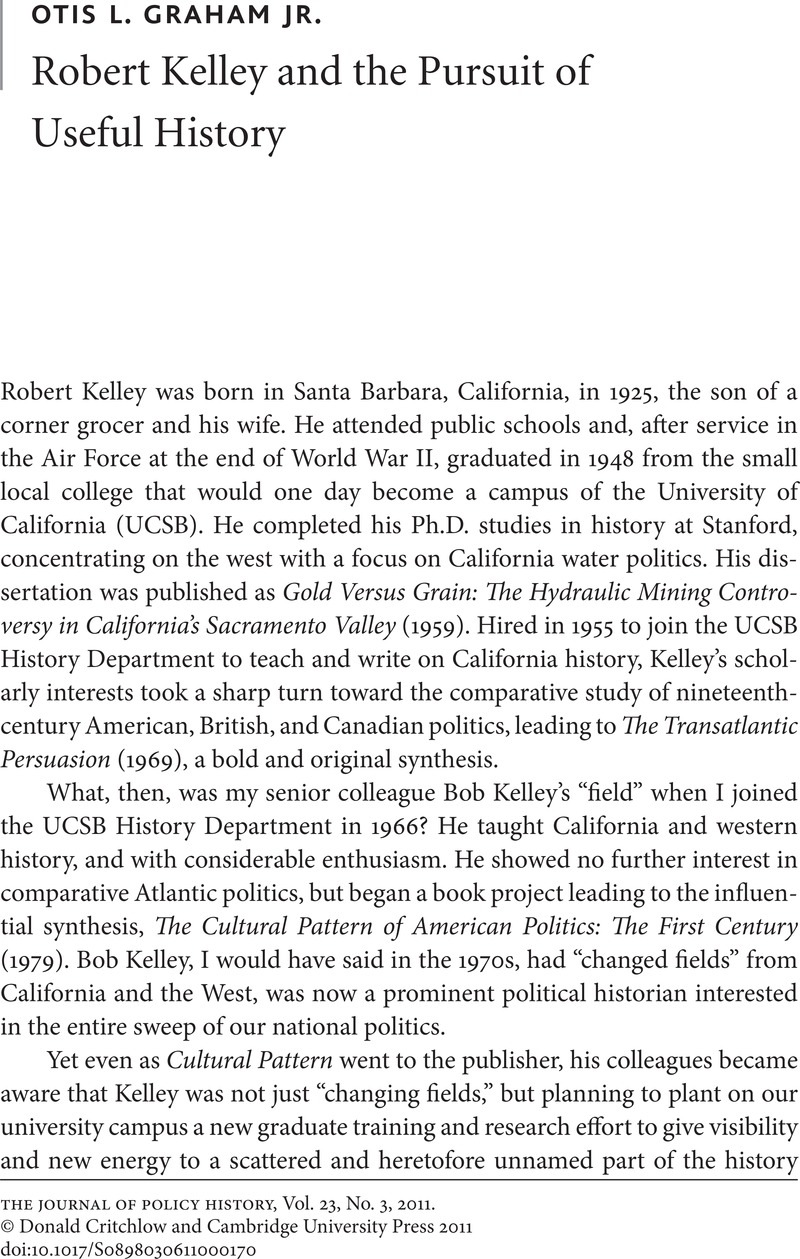Article contents
Robert Kelley and the Pursuit of Useful History
Published online by Cambridge University Press: 25 July 2011
Abstract

- Type
- Pathbreakers
- Information
- Copyright
- Copyright © Donald Critchlow and Cambridge University Press 2011
References
NOTES
1. He discusses this legal consultation and research in Battling the Inland Sea: American Political Culture, Public Policy, and the Sacramento Valley, 1850–1986 (1989), xvi–viii.
2. Robert Kelley, “Public History: Its Origins, Nature, and Prospects,” The Public Historian 1 (1978).
3. For an account, see “First National Symposium on Public History,” The Public Historian 2 (Fall 1979): 7–83.
4. For a partial bibliography of writing on history’s policy misuses, see pp. 348–49 in Otis L. Graham Jr., Losing Time: The Industrial Policy Debate (1992).
5. I found a copy of the historians’ letter to Carter and have deposited it in the seventy boxes of the Robert Kelley Papers archived in Special Collections at the University of California, Santa Barbara Library.
6. Graham, Losing Time, 264–65; Stuart Eizenstat, “A ‘Historical Memory’ for President,” New York Times, 14 January 1987, A27.
7. Julian, Zelizer, “Clio’s Lost Tribe: Policy History Since 1978,” Journal of Policy History 12 (2000).Google Scholar
8. Keller and McCraw to Robert Kelley, 13 July 1978, Robert Kelley Papers, Box 4.
9. The conference was reported in Michael, Grossberg, “A Report on the Conference on the History of American Public Policy,” The Public Historian 1 (1979).Google Scholar
10. For a copy marked by the author, see Robert Kelley, “The History of Public Policy: Does It Have a Distinctive Character and Method?” Robert Kelley Papers, Box 44. The address was published in Federal Social Policy: The Historical Dimension, ed. Ellis W. Hawley and Donald Critchlow (1986). For a revised version, see Robert, Kelley, “The Idea of Policy History,” The Public Historian 19 (Winter 1988).Google Scholar
11. Hugh, Davis Graham, “The Stunted Career of Policy History: A Critique and an Agenda,” The Public Historian (Spring 1993): 15, 20–21.Google Scholar
12. Zelizer, “Clio’s Lost Tribe,” 379.
13. Robert Kelley, “The Idea of Policy History,” 39.
14. “UCSB Has a First Public Policy BA,” Campus (17 October 1983), and “Announcement: The Undergraduate Major in the History of Public Policy” (1 November 1988), Robert Kelley Papers, Box 69.
15. Robert, Kelley, “Ideology and Political Culture from Jefferson to Nixon,” American Historical Review 82 (June 1977): 561.Google Scholar
16. Battling the Inland Sea (1989): Robert, Kelley, “The Interplay of American Political Culture and Public Policy: The Sacramento River as a Case Study,” Journal of Policy History 1 (1989): 1–23.Google Scholar “My California studies,” he wrote there, “are a segment of my research and teaching interests as a whole . . . the entire sweep of American politics and public policy.”
17. The Public Historian 15 (Fall 1993): 9.
- 1
- Cited by


